1. What is Coronavirus?
A new virus called the severe acute respiratory syndrome coronavirus 2 (SARS-CoV-2) was identified as the cause of an infectious disease outbreak that began in China in 2019. The disease is called coronavirus disease 2019 (COVID-19).
COVID-19 appeared in Wuhan, a city in China, in December 2019. Although health officials are still tracing the exact source of this new coronavirus, early hypotheses thought it may be linked to a seafood market in Wuhan, China. Some people who visited the market developed viral pneumonia caused by the new coronavirus. A study that came out on Jan. 25, 2020, notes that the individual with the first reported case became ill on Dec. 1, 2019, and had no link to the seafood market. Investigations are ongoing as to how this virus originated and spread.
In March 2020, the World Health Organization (WHO) declared COVID-19 a pandemic.
🡪 Learn more:
-
Coronaviruses are common in different animals. Rarely, an animal coronavirus can infect humans.
-
There are many different kinds of coronaviruses.
-
Other coronaviruses can cause more serious diseases, including severe acute respiratory syndrome (SARS) and Middle East respiratory syndrome (MERS).
-
Coronaviruses are named for their appearance: Under the microscope, the viruses look like they are covered with pointed structures that surround them like a corona, or crown.
2. How does the coronavirus spread?
Data has shown that it spreads from person to person among those in close contact.
It primarily spreads through droplets of saliva or discharge from the nose when an infected person coughs or sneezes. The droplets generally do not travel more than a few feet (within about 6 feet, or 2 meters), and they fall to the ground (or onto surfaces) in a few seconds.
So it’s important to also practice respiratory etiquette (for example, by coughing into a flexed elbow).
3. What is the incubation period for COVID-19?
On average it takes 5–6 days from when someone is infected with the virus for symptoms to show, however it can take up to 14 days.
4. What are the symptoms of COVID-19 ?
Most Common ones:
-
Fever.
-
Dry Cough.
-
Tiredness.
Less Common ones:
-
Muscle aches and pains.
-
Chills.
-
Sore throat.
-
Diarrhea.
-
Conjunctivitis.
-
Headache.
-
Loss of taste or smell.
-
A rash on skin, or discoloration of fingers or toes.
Serious ones:
-
Difficulty breathing or shortness of breath.
-
Chest pain or pressure.
-
Loss of speech or movement.
5. How is COVID-19 diagnosed?
A physical exam only is not an efficient diagnosis since mild cases of COVID-19 sometimes appear similar to the flu or bad cold.
Therefore, a laboratory test can confirm the diagnosis.
There are two basic types of tests for COVID-19:
-
Viral or diagnostic test: Test prescribed based on the symptoms and some other factors and it can tell you if the patient is currently infected with the coronavirus that causes COVID-19.
-
Antibody test: It can show if the patient was previously exposed to or infected with the virus that causes COVID-19, and if the body has created antibodies in an attempt to defend itself. It takes at least 12 days after exposure for the body to make enough antibodies to show up on a test.
Who should perform the coronavirus test?
-
People who have COVID-19 symptoms, specifically:
-
Hospitalized patients with COVID-19 symptoms
-
People who work in health care facilities and group residences such as nursing homes
-
First responders (emergency medicine technicians, police officers, firefighters and others)
-
People who live in long-term care facilities or other group living settings, including prisons and shelters
Priority next goes to those who:
-
Have COVID-19 symptoms such as fever, cough, shortness of breath or difficulty breathing, chills, muscle pain, new loss of taste or smell, congestion or runny nose, vomiting or diarrhea, or sore throat or fatigue
-
Are recommended for testing by their doctor or local health department for public health monitoring or other reasons
-
People Who Don’t Have COVID-19 Symptoms:
They need to be tested to help prevent the virus’s spread.
-
People Who Have Recovered from COVID-19:
In order to see the patient’s progress in getting over the virus. This is not required, however, and in general, people can stop isolating themselves once enough time has passed and they have started to feel much better.
6. Advices for the public: How and why to prevent?
First of all, It is extremely crucial to keep up to date on the latest information from trusted sources, such as WHO or your local and national health authorities. Local and national authorities are best placed to advise on what people in your area should be doing to protect themselves.
Secondly, for patients who suffer from a chronic medical condition, there are other ways to protect themselves, since they have a higher risk of serious illness.
Thirdly, here are the simplest yet most efficient ways of prevention
|
HOW? |
WHY? |
|
Wash your hands regularly and thoroughly with soap and water, or clean them with alcohol-based hand rub. + Clean and disinfect surfaces you often touch on a daily basis. |
This act kills viruses that may be on your hands. |
|
Maintain at least 1 meter distance between you and people coughing or sneezing. Ideally, you should keep a 6 feet or 2 meters distance. |
When someone coughs, sneezes, or speaks they spray small liquid droplets from their nose or mouth which may contain virus. If you are too close, you can breathe in the droplets, including the COVID-19 virus if the person has the disease. |
|
Avoid touching your face.(eyes, nose, mouth) |
Hands touch many surfaces and can pick up viruses. Once contaminated, hands can transfer the virus to your eyes, nose or mouth. From there, the virus can enter your body and infect you. |
|
Follow a good respiratory hygiene Cover your mouth and nose with your elbow or a tissue when coughing or sneezing. Then immediately throw away the tissue used and wash your hands. |
Droplets spread virus. By following good respiratory hygiene, you protect the people around you from viruses such as cold, flu and COVID-19. |
|
Practice physical distancing by avoiding unnecessary travel and staying away from large groups of people and avoiding going to crowded places. |
Where people come together in crowds, you are more likely to come into close contact with someone that has COVID-19 and it is more difficult to maintain physical distance of 1 meter (3 feet). |
|
Stay home if you feel unwell even with minor symptoms such as cough, headache, mild fever, until you recover. If you need to leave your house, wear a mask to avoid infecting others. |
Avoiding contact with others will protect them from possible COVID-19 and other viruses. |
|
Refrain from smoking. |
It weakens the lungs |
7. Eradicate the myths, Embrace the truth!
-
People should NOT wear masks when exercising, as masks may reduce the ability to breathe comfortably.
-
The likelihood of shoes spreading COVID-19 is very low.
-
The coronavirus disease (COVID-19) is caused by a virus, NOT by bacteria. Thus, antibiotics don’t work against viruses. But Some people who become ill with COVID-19 can also develop a bacterial infection as a complication. In this case, antibiotics may be recommended by a health care provider.
-
The prolonged use of medical masks* when properly worn, DOES NOT cause CO2 intoxication nor oxygen deficiency.
-
Most people who get COVID-19 with mild or moderate symptoms, recover from it.
-
Drinking alcohol does not protect you against COVID-19 and can be dangerous.
-
Thermal scanners CANNOT detect COVID-19. They only detect people who have fever.
- There are currently no drugs licensed for the treatment or prevention of COVID-19.
-
Adding pepper to your soup or other meals DOES NOT prevent or cure COVID-19. But social distancing and a proper respiratory hygiene do.
-
COVID-19 is NOT transmitted through houseflies.
-
Spraying and introducing bleach or another disinfectant into your body WILL NOT protect you against COVID-19 and can be dangerous to your skin and eyes.
-
Drinking methanol, ethanol or bleach DOES NOT prevent or cure COVID-19 and can be extremely dangerous but it DOES harm your internal organs and cause disabilities and kill you.
-
5G mobile networks DO NOT spread COVID-19. Viruses cannot travel on radio waves/mobile networks. Proof, COVID-19 is spreading in many countries that do not have 5G mobile networks.
- Exposing yourself to the sun or temperatures higher than 25°C DOES NOT protect you from COVID-19.
-
Catching COVID-19 DOES NOT mean you will have it for life.
-
Being able to hold your breath for 10 seconds or more without coughing or feeling discomfort DOES NOT mean you are free from COVID-19. The best way to confirm if you have the virus producing COVID-19 disease is with a laboratory test.
-
The COVID-19 virus can spread in hot and humid climates.
-
Cold weather and snow CANNOT kill the COVID-19 virus.
-
Taking a hot bath does not prevent COVID-19The COVID-19 virus CANNOT be spread through mosquito bites.
- Hand dryers are NOT effective in killing the COVID-19 virus BUT alcohol-based hand rub or soap and water are.
-
Ultra-violet (UV) lamps should NOT be used to disinfect hands or other areas of your skin. UV radiation can cause skin irritation and damage your eyes.
-
Vaccines against pneumonia DO NOT protect against the COVID-19 virus. Although these vaccines are not effective against COVID-19, vaccination against respiratory illnesses is highly recommended to protect your health.
-
Rinsing your nose with saline does NOT prevent COVID-19. There is some limited evidence that regularly rinsing the nose with saline can help people recover more quickly from the common cold. However, regularly rinsing the nose has not been shown to prevent respiratory infections.
-
Eating garlic does NOT prevent COVID-19 but Garlic is a healthy food that may have some antimicrobial properties.
-
People of all ages can be infected by the COVID-19 virus.
-
Antibiotics CANNOT prevent or treat COVID-19. Again Antibiotics work only against bacteria, not viruses.
-
There are no medicines that can prevent or treat COVID-19, to date. However, those infected with the virus should receive appropriate care to relieve and treat symptoms, and those with severe illness should receive optimized supportive care.
8. The Mask is the Strongest Weapon!
A. How to wear a non-medical fabric mask safely?
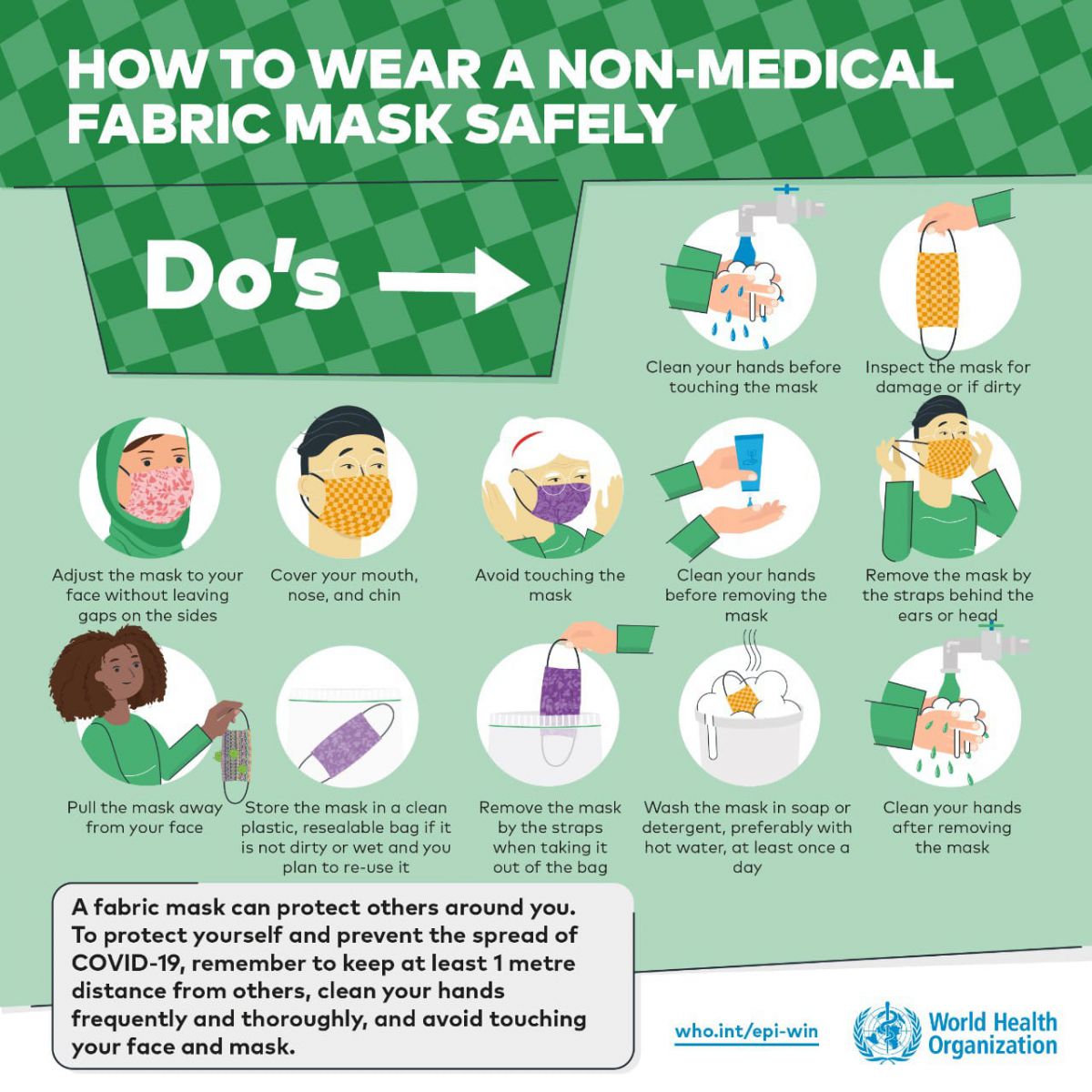
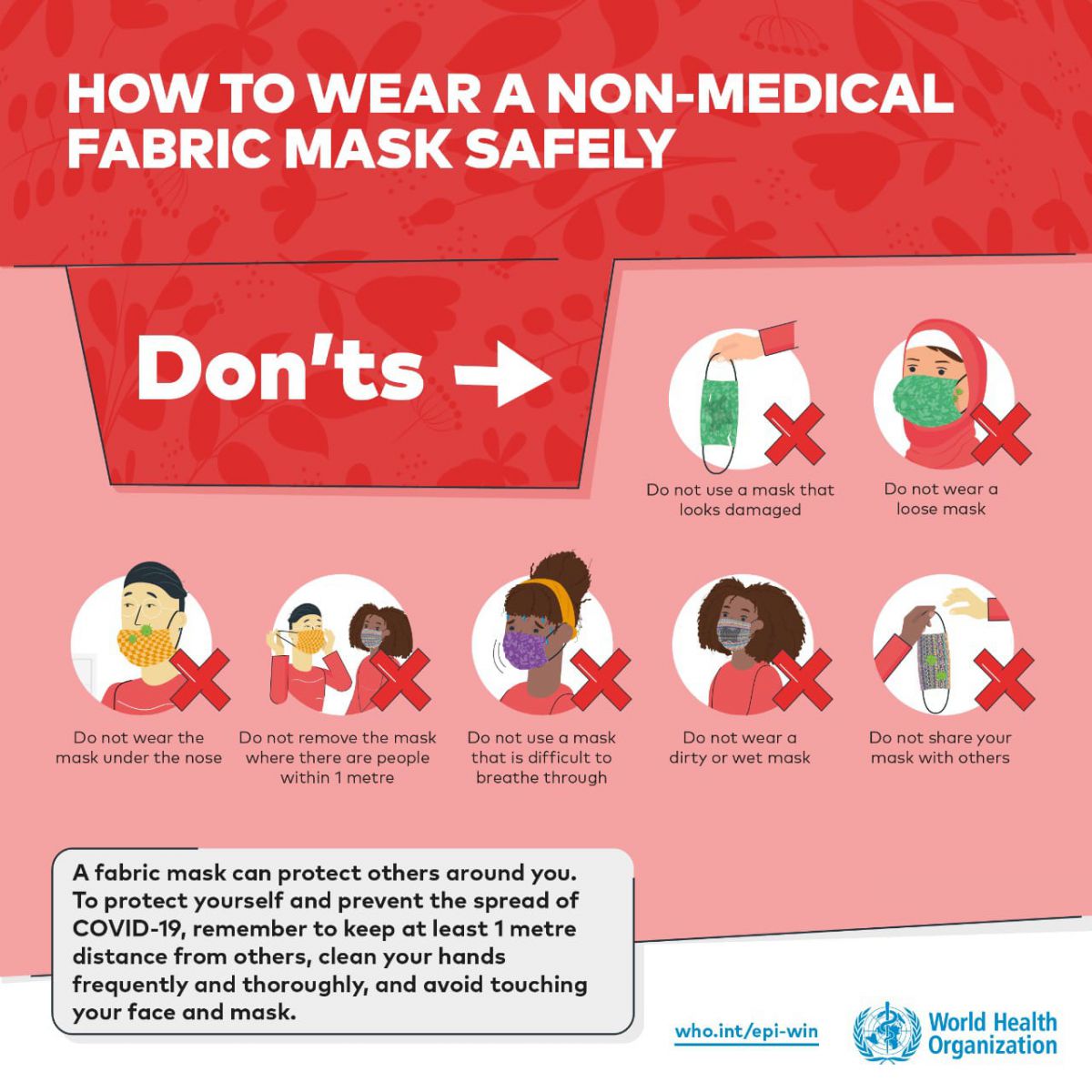
B. How to wear a medical fabric mask safely?
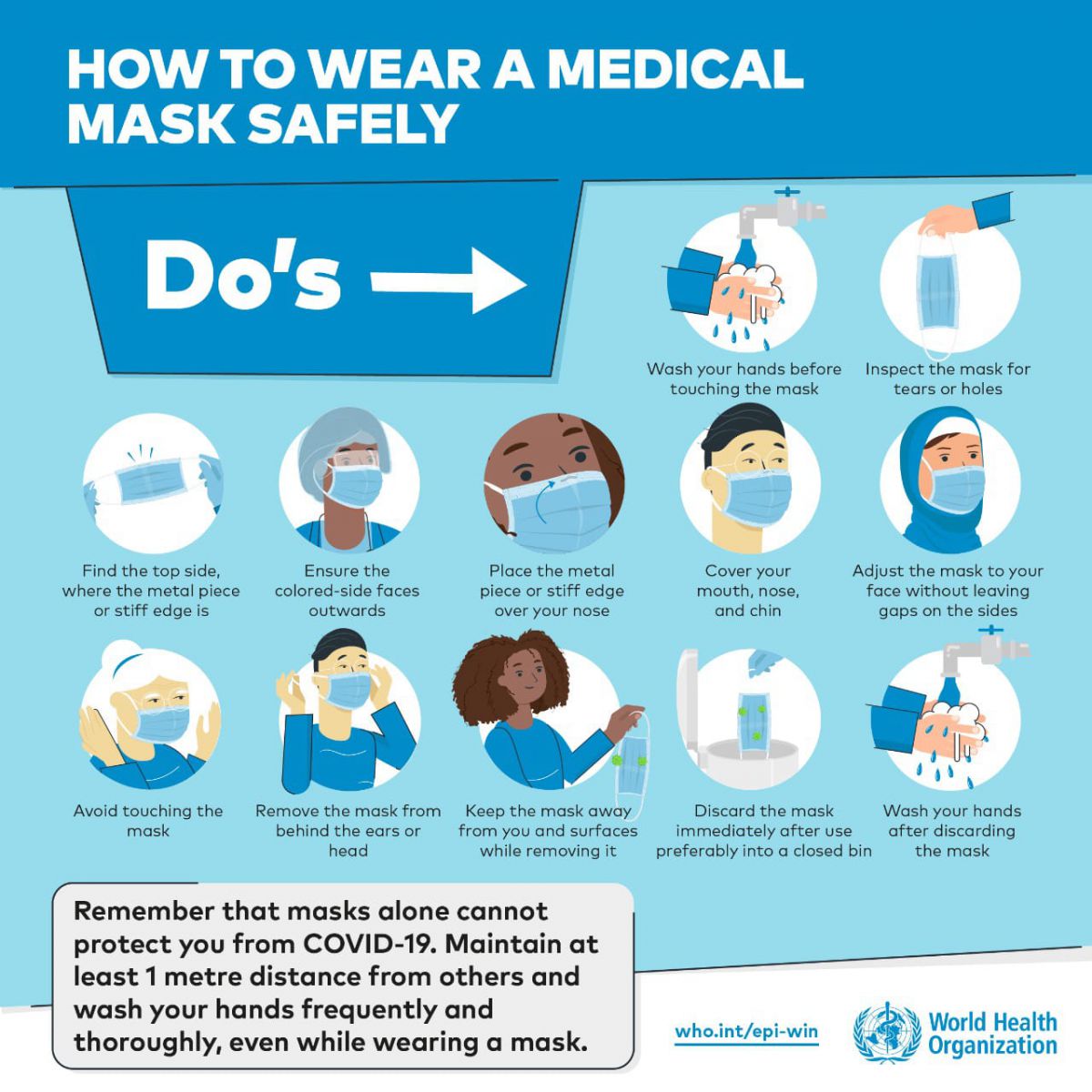
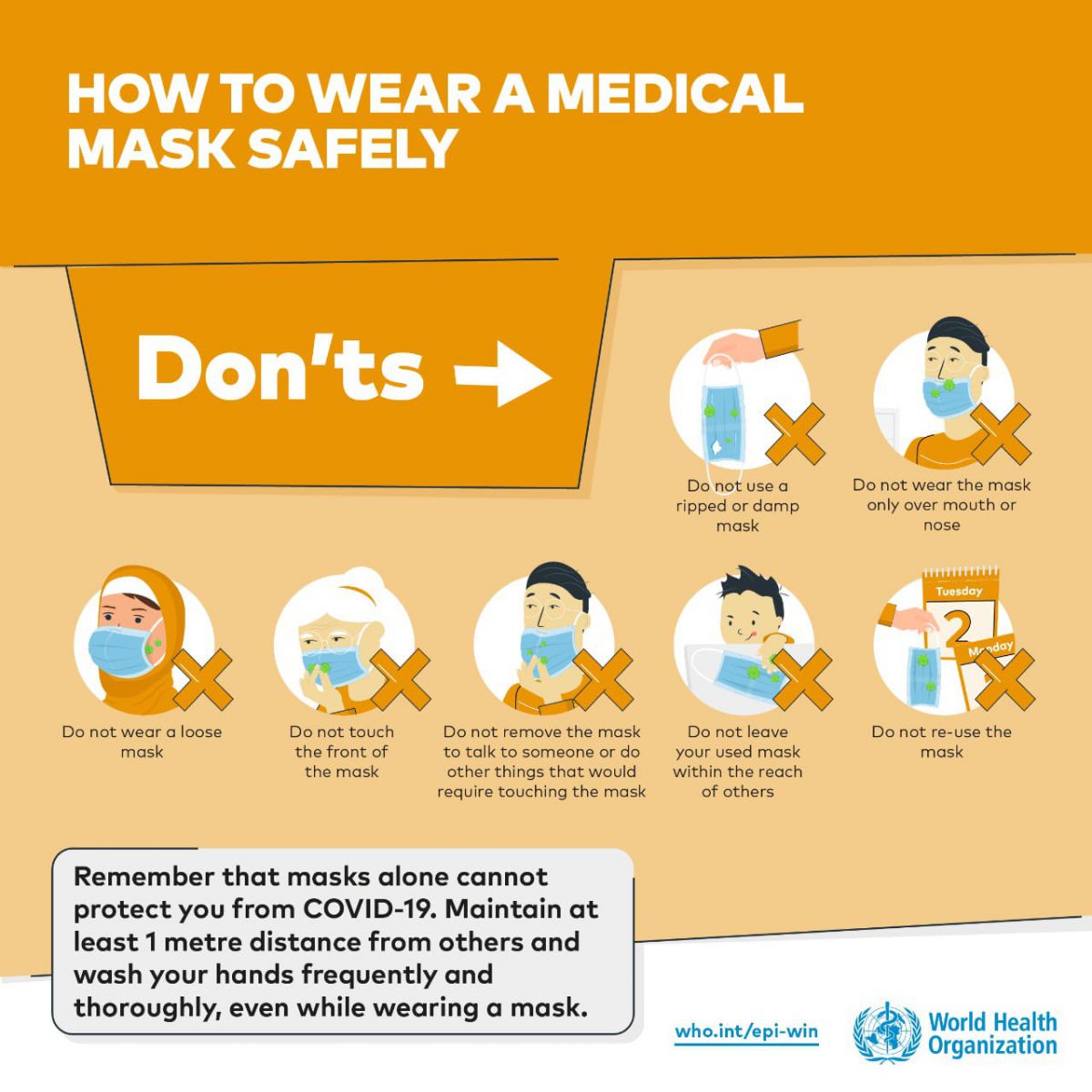
9. WHO Coronavirus Disease (COVID-19) Dashboard
Global Situation
16,775,633 confirmed cases
217,344 new cases
661,244 deaths
Situation by WHO Region
Americas: 8,980,181 confirmed
Europe: 3,283,277 confirmed
South-East Asia: 1,949,850 confirmed
Eastern Mediterranean: 1,507,734 confirmed
Africa: 754,390 confirmed
Western Pacific: 299,460 confirmed
Data last updated: 2020/7/30, 12:09pm CEST
You can find daily updates on the WHO website : https://covid19.who.int
References
1. World Health Organization
https://www.who.int/health-topics/coronavirus#tab=tab_1
2. John Hopkins
https://www.hopkinsmedicine.org/health/conditions-and-diseases/coronavirus
3. Mayo Clinic
Writer : Melissa Mhanna. A medical student at Saint Joseph University of Beyrouth, Lebanon
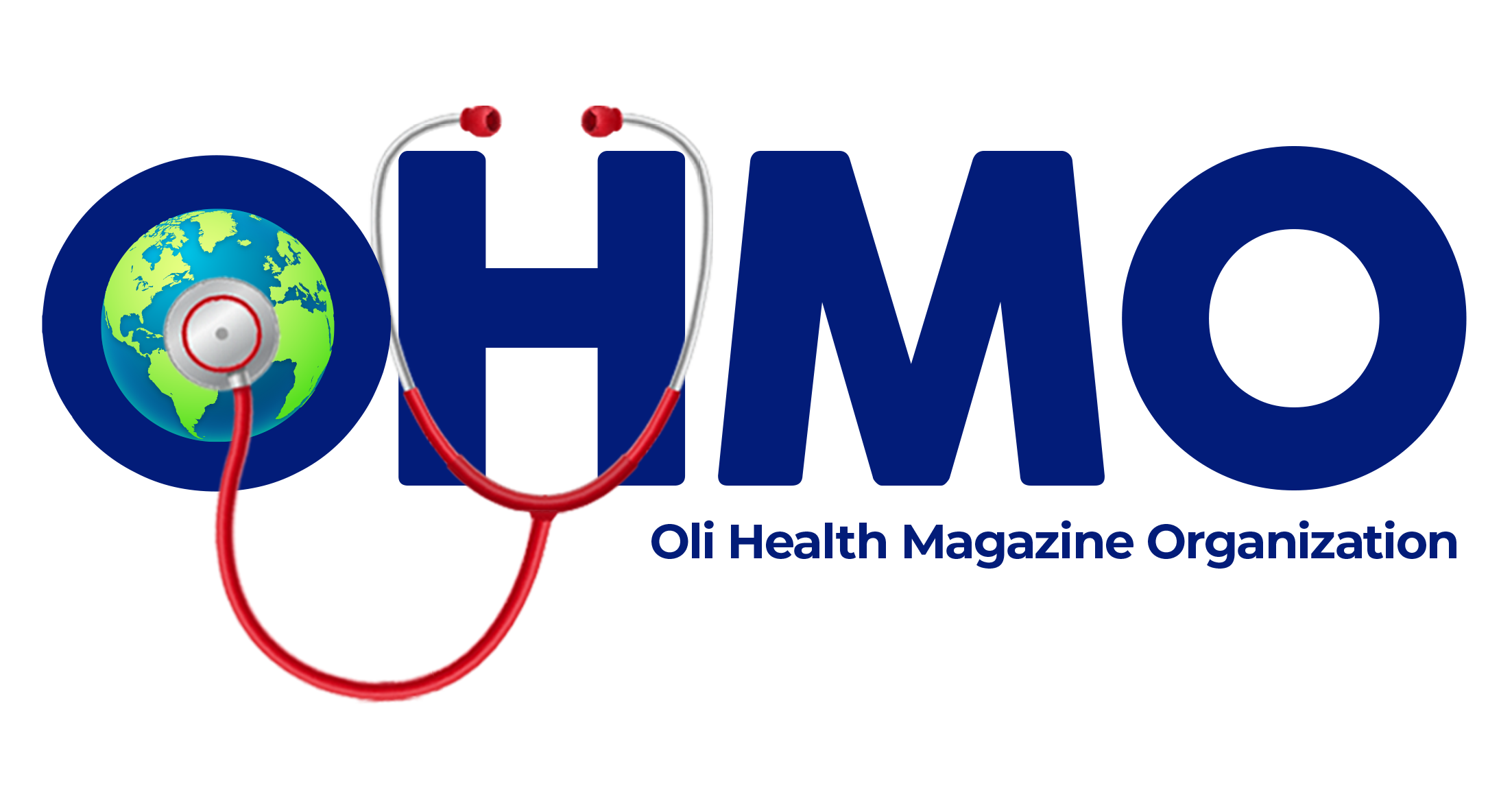
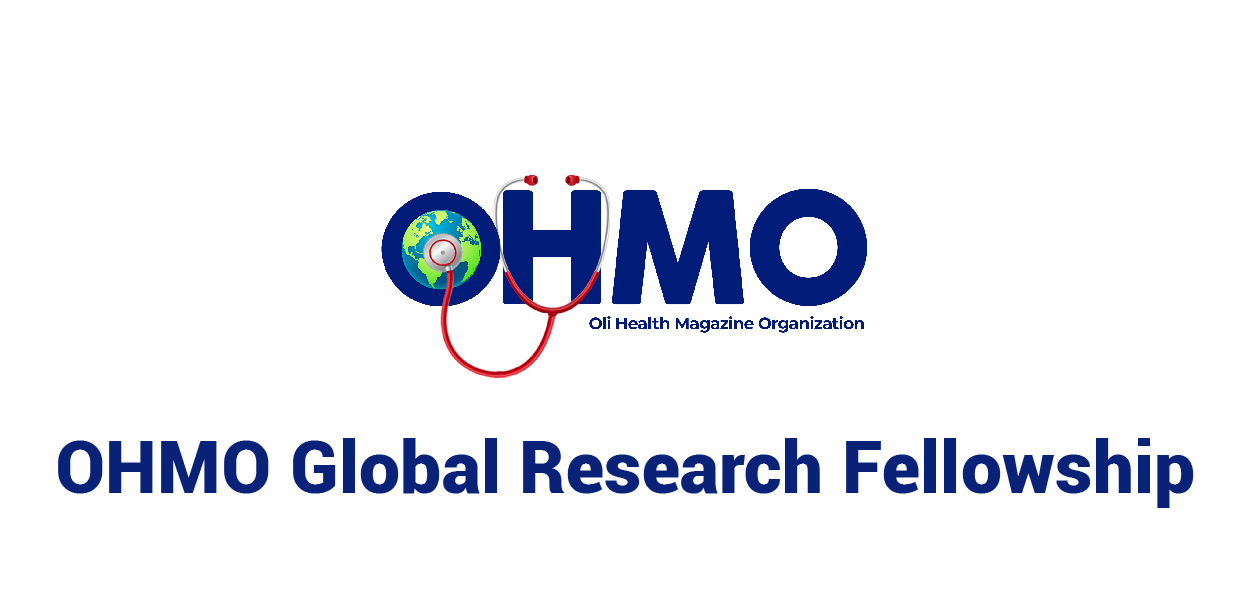


0 Comment